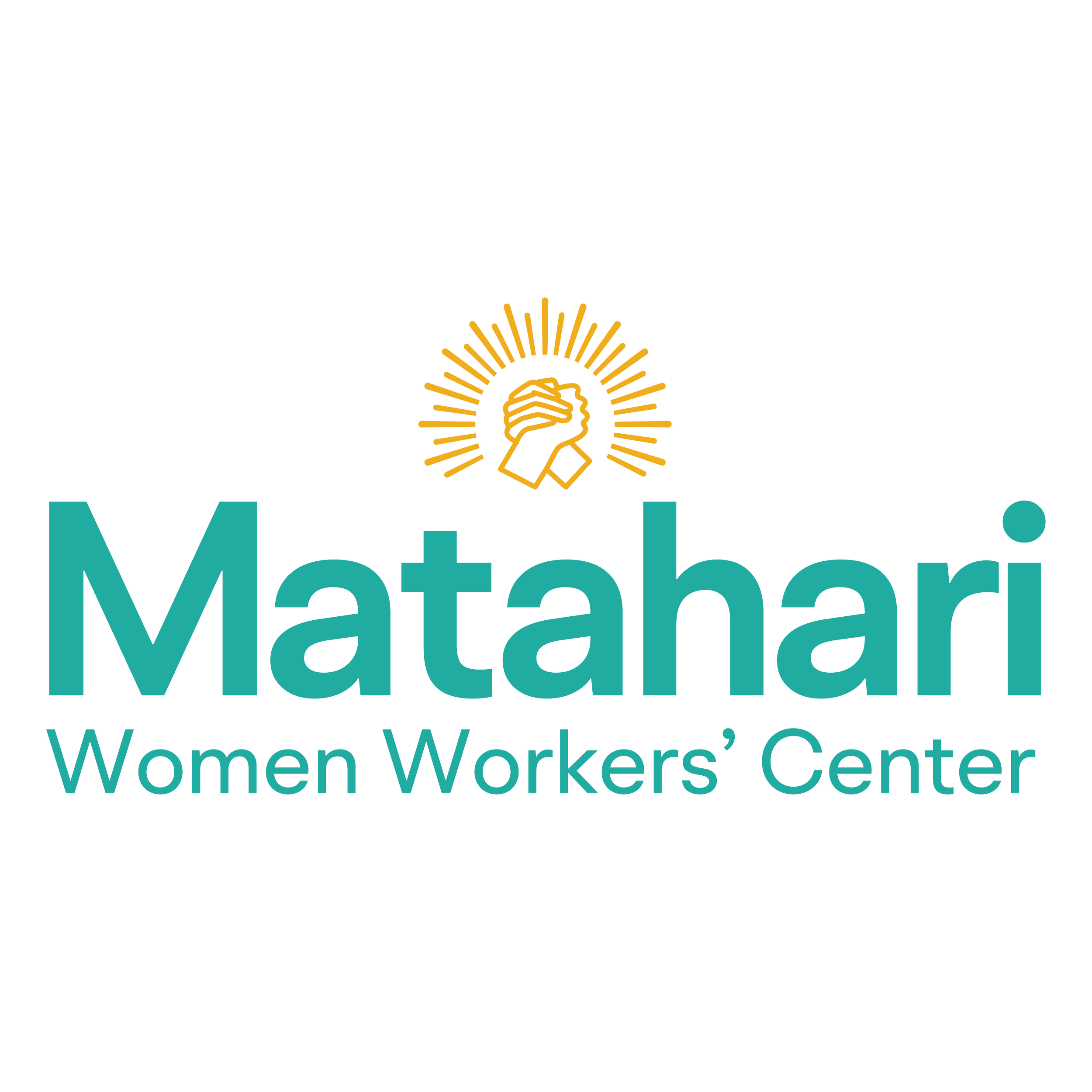Community Resources
Worker Resources
Know Your Rights
Sample employment agreement: A legal right for domestic workers in MA and a critical tool for clear communication during the pandemic. ( Español | Português)
Covid-19 Guidelines
Know Your Rights for Domestic Workers During the Pandemic: Frequently Asked Questions compiled by Matahari
Matahari's Working During the Pandemic Guidance for Nannies and Nanny Employers: A digital packet compiled by Matahari member-leaders, including:
Agreement for Nanny Work During Covid-19 from the National Domestic Workers' Alliance (Español)
Matahari’s Letter to Nannies and Nanny Employers: Recommendations for employer contributions to nannies health care costs, severance pay, and paid time off. (Español | Português)
Families First Coronavirus Response Act Paid Leave Form: A form to support nannies in accessing paid leave under the Families First Coronavirus Response Act. (Español)
Coronavirus Safety Tips & Resources for Domestic Workers: Staying home isn’t an option for many domestic workers. Refer to these tips and trainings compiled by the NDWA so you can continue to provide excellent care while keeping yourself, your family and clients safe.
Financial Resources
Matahari Emergency Relief Funds: Active Matahari members may apply for up to $500 in financial assistance. New requests are reviewed and processed by the Healing Justice Committee. For more information, please contact Juliana Morris at 617-380-3952 or health@mataharijustice.org.
Unemployment Benefits
Apply for Unemployment Benefits online. Click here for a step-by-step process of what you can expect.
Pandemic Unemployment Assistance (PUA) provides up to 39 weeks of unemployment benefits to individuals who are not eligible for other types of unemployment. Learn more here.
Federal Pandemic Unemployment Assistance (FPUC) provides an additional $600 weekly benefit to those eligible for PUA.
Domestic Employer Resources
Massachusetts COVID-19 Toolkit for Domestic Employers by Hand In Hand: The Domestic Employers Network
Pledge to continue paying the nanny, house cleaner or attendant you employ through this crisis
Mutual aid
Click here to find a Covid-19 Mutual Aid Networks in your neighborhood.
Mutual Aid Toolkit for volunteer-run and grassroots-led groups.
Food Assistance
Greater Boston Food Bank: If you or someone you know needs food, use this Partner Agency Locator to find available food assistance options.
Rent Assistance
Office of Housing Stability: If you’re at risk of being evicted, learn how to respond here.
Residential Assistance for Families in Transition (RAFT) & Emergency Rent and Mortgage Assistance (ERMA) provide short-term financial assistance to low-income families who are homeless or at risk of becoming homeless.
Click here to learn about more about these programs from Metro Housing Boston, and submit an application.
City of Boston Rental Relief Fund: The fund assists tenants with their rental payments. The aid is available to income-eligible tenants in the city of Boston who do not have access to expanded unemployment benefits or, due to the nature of their jobs, the unemployment benefits they receive represent a significant reduction in their actual income.
City Life/Vida Urbana: Call their housing hotline at 617 934-5006 (English) and 617-397-3773 (Spanish) if you are in danger of being evicted. CLVU hosts weekly meetings where you can speak with a lawyer.
Greater Boston Legal Services (GBLS): Free self-guided questionnaire, available in six languages, that helps ensure that tenants respond to their landlord's eviction case correctly.
Harvard Legal Aid Bureau: The Harvard Legal Aid Bureau runs a free weekly Eviction Clinic to help tenants prepare for their day in court.
Massachusetts HomeBASE Program: Financial assistance for those who are homeless, facing imminent eviction, or are currently living in subsidized hotel or motel rooms paid for by the state of Massachusetts.
Tenancy Preservation Program: Although originally intended to assist families that were facing eviction as a result of behavior related to a disability (mental illness, substance abuse, etc.), during Covid, it has been expanded to offer services to other vulnerable households, including those eligible for Family Emergency Assistance and low-income seniors. They provide case management support and act as a neutral third party to help tenants and landlords reach agreements.
Additional Resources:
Ways to Support
This crisis is disproportionately hurting Black, brown, Indigenous and undocumented people, womxn, elders and disabled people, and people trapped in prisons and detention.
Since millions are not eligible to receive a federal stimulus check, community-led efforts are leading the way on caring for people in crisis. One of the most powerful things we can do if we have wealth or class privilege is to share resources. Here are some ideas:
Feeling Powerless About Coronavirus? Join a Mutual-Aid Network by Charlie Warzel, New York Times
Support Matahari - Your contribution will allow Matahari to continue operating and building capacity as we shift our to adjust the needs of our community under crisis.
Covid-19 Update: 04/09/20
Matahari’s commitment to #StayHomeButNotSilent.
Covid-19 Update: 03/27/20
Reframing social distancing as social solidarity.
Covid-19 Update: 03/18/20
Matahari moves online & other updates.




